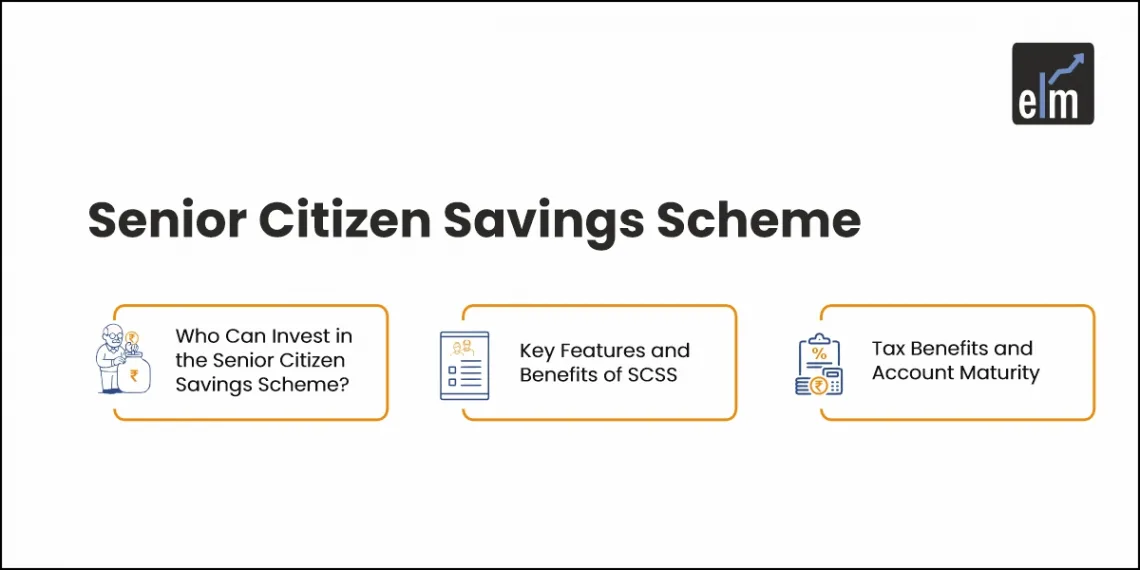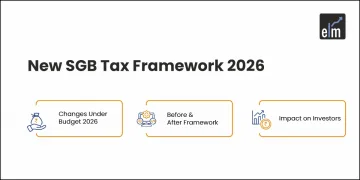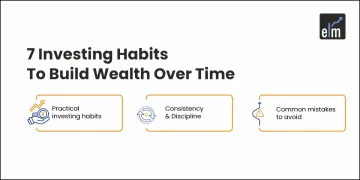Senior Citizen Savings Scheme is an Indian post office savings scheme for senior citizens. It allows you to invest a lump sum of up to Rs.15 lakhs with a 5-year lock-in period. The interest payments are made quarterly to ensure that the senior citizens have consistent income. Because it is government-backed, it is a risk-free scheme.
Furthermore, investment in this scheme qualifies for an income tax deduction under Section 80C. So, if you want to invest your lump sum retirement funds and earn good returns, then this scheme is for you.
So, in today’s blog, let’s discuss about the Senior Citizen Savings Scheme and responsibly plan your and your loved ones’ retirement.
What is the Senior Citizen Savings Scheme?
The 5-Year Senior Citizen Saving Scheme is the most secure tax-saving investment option for senior citizens aged 60 and up. It is a government-backed scheme designed to provide security in old age. As a result, the risk of losing your investments is almost non-existent. The original maturity period is five years, as the name suggests, and it can be extended for another three years.
Any post office, private bank, or public sector bank can open a 5-Year Senior Citizen Saving Scheme account. It intends to provide the most secure way to invest lump sum retirement funds, and also, after retirement, senior citizens will receive regular (quarterly) earrings.
Investing in this scheme also qualifies for a tax deduction under Section 80 C of the Income Tax.
Who Can Invest in Senior Citizen Savings Scheme?
The government has set the minimum investment age for individuals at 60 for Senior Citizen Savings Scheme.
Early retirees can also invest between the ages of 55 and 60 if they have chosen voluntary or company retirement. This provision requires that investments be made within one month of receiving retirement benefits.
Please remember that NRIs and HUFs (Hindu Undivided Family) are not permitted to invest in this scheme.
Defense personnel aged 50 and up are also eligible to participate in this scheme.
Benefits of the Senior Citizen Savings Scheme
- Multiple Accounts: Up to a total of Rs 15 lakh can be held in more than one 5-year senior citizen saving scheme account.
- Good Returns: The senior citizen savings scheme interest rate is 8.6% compounded and paid quarterly, providing a good return.
- Tax Benefit: The amount invested is tax deductible up to Rs 1.5 lakhs under Section 80C.
- Extensive Period: Even after the five-year lock-in period, you can extend the time period of your investments by three years.
- Joint Venture Permissible: You and your spouse can share a senior citizen savings scheme account.
- Nominees: You may add one or more nominees to your senior citizen savings scheme account.
- Lump Sum Investment: Provides a safe way to invest the lump sum money you receive at retirement. As a result, it is a one-time payment.
- Deposit Method: Cash or DD deposits are also accepted. Electronic transfers are not required. A deposit of more than one lakh rupees, on the other hand, must be made by cheque.
Features of Senior Citizen Savings Scheme
Here are the features of the Senior Citizen Savings Scheme-
Interest Rate
The Senior Citizen Savings Scheme (SCSS) now has an annual interest rate of 8.0% for the fourth quarter of fiscal year 2022-23. This programme is open to anyone over the age of 60. Retirees over 55 but under 60 can participate in this arrangement if they invest within a month of receiving retirement benefits. You can open a SCSS account with as little as Rs 1,000. The maximum amount you can invest is Rs 15 lakh. Remember that the account only pays interest every three months. The account has a five-year maturity period, which can be extended by three years.
Investment Limit
Let us go over the various investment limits available under the Senior Citizen Saving Scheme one by one.
Minimum Amount
The minimum investment is Rs 1000, with multiples of that amount required.
Maximum Allowable Amount
This scheme allows for a maximum investment of Rs. 15 lakhs, but only in denominations of Rs. 1,000. You must ensure that the amount you invest is less than what you will receive upon retirement. This means you can invest either Rs. 15 lakhs or the money you received as a retirement benefit in this scheme, whichever is less valuable.
Number of Accounts
There is no limit to the number of accounts a senior citizen can maintain. You can invest in a single or joint account with your spouse. The spouse must be the depositor in a joint account, not a son or daughter. However, the total amount of money in all accounts must not exceed the maximum limit.
Cash investment
If the investment amount is less than Rs. 1 lakh, it can be opened with cash. If the investment exceeds Rs. 1 lakh, the transaction must be completed by cheque. When the amount is reflected in the government’s books, the investment date for cheque deposits is determined.
How to Open a 5 Year Senior Citizens Savings Account?
It is very simple to open an account under this scheme. Gather the necessary documentation and follow the steps below to open an account under the 5-year Senior Citizen Saving Scheme:
- Visit any post office or bank where a senior citizen savings scheme account can be opened.
- Fill out the account registration form.
- Gather all documents, self-attest them, and submit them with the completed account opening form.
- You will be given your account’s ‘passbook’ once it has been opened. Your passbook will include your account number, account opening date, your (depositor’s) name, address, photograph, and the tenure of your account. It will also include information on deposits made as well as the interest rate payable at the end of each quarter.
Tax Redemptions
At maturity, the investment is tax-free in the year of purchase, but withdrawals are taxable.
At the time of the early withdrawal:
On the death of the depositor – If a premature withdrawal is made due to the depositor’s death, the principal amount is not taxed, but tax is still levied on the interest amount received by legal heirs or nominees.
In other words, if the amount invested in a senior citizen savings scheme is withdrawn before maturity, except in the case of death, the entire amount received, principal and interest, is taxable.
Interest earned on SCSS investments is taxable. Here’s a breakdown of the tax implications:
Interest Income:
- Interest earned on SCSS is fully taxable in the hands of the investor, regardless of their age.
- It is added to your other income and taxed according to your income tax slab.
- TDS (Tax Deducted at Source) is applicable if the annual interest earned exceeds Rs. 50,000 in a financial year.
Investment Amount:
- The investment amount itself is not taxable at the time of redemption.
- However, if you had availed any tax deductions on the investment amount under Section 80C, those deductions need to be reversed in the year of redemption.
Example:
- You invested Rs. 1,00,000 in SCSS, claiming a deduction of Rs. 15,000 under Section 80C.
- You earned Rs. 12,000 interest in the first year.
- At the time of redemption (assuming no further interest accrual), you will receive Rs. 1,12,000 (investment + interest).
- Rs. 12,000 interest will be taxed as per your income tax slab.
- Rs. 15,000 (deduction claimed) will be added back to your taxable income in the year of redemption.
Bottomline
All things considered, the older Citizen Savings Scheme offers tax advantages and a stable investment option for older persons in India, which is why retirees favour it.
For more Market Updates, Visit StockEdge
Frequently Asked Questions (FAQs)
1. Who is eligible to invest in the Senior Citizen Savings Scheme (SCSS)?
Investing in the SCSS is open to anyone 60 years of age or older. Subject to certain restrictions, those who have retired or voluntarily retired after the age of 55 but before the age of 60 may also invest.
2. What is the maximum investment limit in the SCSS?
The SCSS has a maximum investment cap of ₹15 lakhs. It is necessary to make investments in multiples of ₹1,000.
3. What is the tenure of the Senior Citizen Savings Scheme?
The SCSS has a five-year maturity period. Investors can choose to extend the scheme for an extra three years after it matures.








